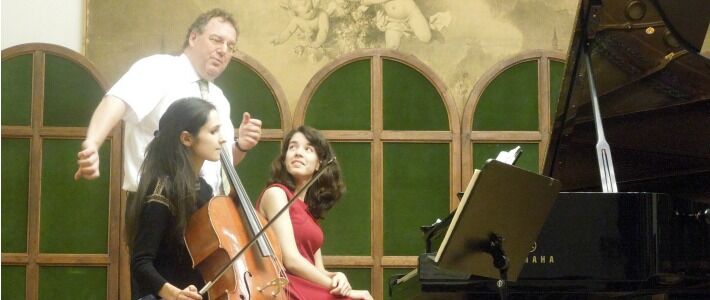Major Recordings
- TAMYCD1 Baillie/Thwaites; Recital Disc, including Brahms, Debussy, Martinu, Fauré, Frescobaldi. (2000)
- CDE84519 Primrose Piano Quartet: Bax, Hurlstone, Quilter, Dunhill.(2004)
- CDSA6880 With the Dante Quartet: Lyapunov Sextet for Piano and Strings. (2005)
- CDE84547 Primrose Piano Quartet: Bridge, Howells, Alwyn, Scott. (2006)
- CDE84584 Primrose Piano Quartet: Strauss Piano Quartet, Violin and Cello Sonatas. (2010)
- CDE84586 Primrose Piano Quartet: Burns Variations, Sir Peter Maxwell-Davies Piano Quartet, Dmitri Smirnov. Three World Première recordings. (2011)
- CDE84599 Primrose Piano Quartet: Fauré, Brahms (Op.25), (using a Blüthner piano selected by Johannes Brahms in 1895). (2012)
- SOMM251-2 Alexander Baillie and John Thwaites: Rubbra, Ireland, Bridge, Delius, Keys, Clarke. Double Disc of Cello Sonatas including World Première recording of Ivor Keys. (2013)
- CDE84630 Primrose Piano Quartet: Schubert Piano Trio in B flat and Arpeggione Sonata (2014)
- SOMMCD0158 Brahms Op. 38/99/121 Alexander Baillie and John Thwaites, using period pianos in Vienna. (2016)
- CDE84621 Primrose Piano Quartet. World Première recording of commissioned Piano Quartet (2015) by Anthony Payne. Elgar Quintet. Hobrooke Ballade with Ronald Woodley (and York Bowen Clarinet Quintet with strings)
These recordings have gathered Five Star reviews, been selected as Recordings of the Month, and been judged the best in their field. Tully Potter, The Strad, (May 2005) , of CDE84519 : ”I prefer this version of the Hurlstone to the recent one by the Dussek Trio with James Boyd (Dutton)”, Calum MacDonald in BBC Music Magazine, (October 2013) : “these are probably the best current versions of the Bridge, Ireland, Rubbra and Delius” and Nigel Simone in International Record Review, (October 2013) : “Baillie and Thwaites give a performance that I find more convincing than any I’ve encountered before (including, even, Jacqueline and Iris Du Pré).
CDE84547 was a Five Star Classic FM Magazine Choice.
"...gloriously natural and unforced interpretative approach" Julian Haylock, Classic FM Magazine . (2006)
"The playing is selflessly beautiful. Everything seems to be just right" Tully Potter, The Strad. (2006)
"All this music is well crafted and very well played" Rob Cowan, The Independent. (2006)
CDSA6880 and SOMM251-2 were Double Five Star reviewed as BBC Music Magazine Chamber Music Choices of the Month.
SOMM251-2 was reviewed in The Observer (20.10.13) by Stephen Pritchard: "...remarkable for the totally consistent quality of playing and good taste. It’s an outstanding partnership. Throughout, Baillie's rewardingly intelligent phrasing is matched by Thwaites's warm, generous, perfectly judged pianism".
"These are passionate, focused, full-blooded readings without a hint of reticence or apology. Alexander Baillie and John Thwaites invest each work with the power of utter belief, and as a result these are probably the best current versions of the Bridge, Ireland, Rubbra and Delius Sonatas" Calum MacDonald, BBC Music Magazine (October 2013).
"The whole of this rewarding programme is as successful in its execution as it was in the planning. Baillie and Thwaites give a performance that I find more convincing than any I've encountered before. Since the performances are so consistently engrossing, it goes way beyond being merely useful in terms of repertoire. Baillie and Thwaites, as well as the SOMM recording team, deserve the warmest congratulations for such a fascinating and absorbing pair of discs" Nigel Simone, International Record Review (October 2013).
CDE84599 was one of eight recordings selected to form part of BBC Radio Three’s Building a Library in CD Review, Saturday 4th October 2014, Brahms’s Piano Quartet in G minor Op.25. Ivan Hewett broadcast the following critical judgements: “One recording which has an exemplary clarity comes from the Primrose Piano Quartet on Meridian. They play with great stylistic awareness but there’s no doubt that they are helped by the use of an historic Blüthner Piano chosen by Brahms for one of his pupils” (Extracts played from 3 movements…)” At the other end of the scale, and probably much truer to what Brahms had in mind, is the Primrose Quartet. That light approach leaves space for the music to become grander later”.”The Primrose Quartet is especially good in the Finale’s sweetly sentimental E minor episode, proving that here a light touch is probably the best sort…(extract)…”The Primrose with pianist John Thwaites relishing the tone of the Blüthner piano in the closing bars of that slow episode”.
SOMMCD0158 “Pianist John Thwaites adopts Brahms’s technique of “dislocated” hands most effectively, particularly in the serene Allegro non troppo coda. Speeds are judicious, not rushed in the Intermezzo, suitably propulsive in the Allegro. Thwaites/Baillie absorb Fanny Davies’s wonderful image of Brahms lingering “not on a note, but on a whole idea, as if unable to tear himself away from its beauty” in Op.99’s deeply-felt Adagio affettuoso. Helen Wallace, BBC Music Magazine, November 2016.
“The performances are wonderfully involving and expressive. Tempos are quick by the clock, but they don’t sound fast because of the openness and clarity of the instruments. Regarding the classical-romantic divide they seem clearly on the romantic side, with lots of little, telling moments and flexible tempos, and Thwaites indulges in asyncronicity or dislocation, where the hands do not play quite together, thus minimizing percussiveness in the piano and providing better separation of voices. I can best compliment this venture by saying that the performers are here to play expressive music, rather than simply to fulfil a musicological exercise. This would not be a first choice if you’re allergic to period style, but it would certainly be worth having as a contrast or foil to Du Pre/Barenboim, Ma/Ax or Rostropovich/Serkin” Althouse, American Record Guide, January 2017
“The artists offer very intelligent readings of all three works and lend them a tremendous momentum generated by an informed feeling for the ebb and flow of the musical argument.” Joanne Talbot, The Strad, September 2016.
“The idea here is so appealing..ardent performances…Thwaites’s thoughtful and comprehensive booklet-notes would be the best reason to buy this recording” Richard Bratby, Gramophone, October 2016
CDE84621 “This attractive disc sets a new work by Anthony Payne, his Piano Quartet of 2015, aptly beside Elgar: the Piano Quintet, captivatingly performed.” Paul Driver, Sunday Times, 22/1/17.
“The Primrose Piano Quartet, whose members are drawn from groups such as the Lindsay, Maggini, and Allegri quartets are, as one would expect, a highly polished ensemble. As the first movement progresses the Primrose’s performance reveals a wittiness that is lacking in many other recordings of this music, without sacrificing any of the drama that emerges as the movement develops. I found the central movement to be among the most satisfying of the recordings that I auditioned. (In the Finale) They have identified a musical line that allows the music to ebb and flow to produce a very satisfying conclusion to the work. Overall this is a Piano Quintet that can compare favourably with any of its rivals” Stuart Freed, The Elgar Society Journal, April 2017.
 Coaching Chamber Music in Budapest
Coaching Chamber Music in Budapest